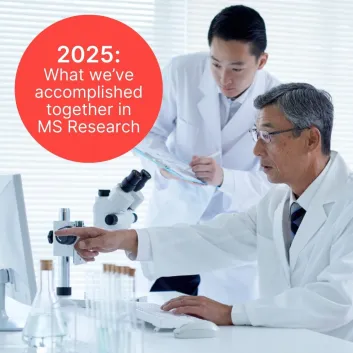- Research
- December 10, 2024
Research Advances that are Paving the Way to a Future Without MS
Here’s What We Achieved Together in 2024

Reflecting on this past year in research, we’re proud to highlight the great work and progress that’s advancing our understanding of multiple sclerosis (MS). Advances in research are only possible through the valuable contributions and generous support from the amazing MS community, including people living with MS, event participants, volunteers, fundraisers, donors, research partners, researchers, clinicians, and many others. The unwavering collective support and dedication are moving us closer towards a future free of MS!
Below we share some of the exciting research from this year, including Canadian MS research achievements on the global stage, our support in strengthening connections within the MS community, and new research within our impact goals.
We drive the momentum of MS research forward by investing in promising work across our impact goals, which are a roadmap for our journey towards a world without MS. Our impact goals focus on advancing treatment and care, to help people on their unique MS journey; enhancing well-being by ensuring that people living with MS have access to opportunities and supports; understanding the mechanisms of MS progression to stop the disease in its tracks; and preventing MS before it can even begin.
Here are some of the research advances in the past year across the following impact goal areas.
Advancing Treatment and Care
- The First Canadian Best Practice Guidelines for MS Rehabilitation. This year, we partnered with Saskatchewan Health Research Foundation (SHRF) to support Dr. Sarah Donkers’ (University of Saskatchewan) work on creating a series of clinical guidelines or recommendations for MS rehabilitation and symptom management, based on best available evidence and input from experts and people with MS. These guidelines will be a helpful resource for improving the quality of care and health outcomes for people living with MS. Read more about this study.
- A Novel Intervention to Improve Balance in People with MS. Research led by Dr. Aimee Nelson (McMaster University) will test a unique training method for improving balance in people with MS. Study participants will be asked to control a video game using signals from their leg and arm muscles while standing with or without assistance. This research could help reverse the loss of function and encourage physical activity in people living with MS. Read more about this study.
Understanding and Halting Disease Progression
Targeting Neurodegeneration in MS. Research led by Dr. Michael Levin (University of Saskatchewan) found that a dysfunction in a factor called ‘hnRNP A1’ is associated with neurodegeneration in MS (read more about the findings). In a new study funded in partnership with SHRF, Dr. Levin and his team will develop small molecule treatments that can rescue the function of hnRNP A1 to reduce neurodegeneration in animal models of MS. This study could help find new treatments to test in early clinical trials for people with progressive MS. Learn more about this study.
- A Promising Candidate to Promote Neuroprotection and Repair Processes in MS. Dr. Soheila Karimi’s (University of Manitoba) research, which we funded, found a potential treatment, called Neuregulin-1, that could help repair the protective covering of nerve fibres and prevent further damage. In this new study, the research team will use mice with MS-like disease to test how effective Neuregulin-1 is as a treatment that protects nerves and helps repair them in progressive MS, particularly in improving cognition, movement, and sensation (feeling). This research will be very important for future development of new treatments for progressive MS. Read more about this study.
Preventing MS
An Opportunity for Earlier Detection and Prevention of MS. For many years we’ve supported Dr. Helen Tremlett’s (University of British Columbia) work on characterizing the MS prodrome, which involves studying the early signs or symptoms that occur years before MS is officially diagnosed. A recent report from Dr. Tremlett’s team found that people with MS often needed to use healthcare services to support their mental health needs and gastrointestinal-related problems in the five years before their MS diagnosis. This is very important work as a better characterization of the MS prodrome may allow for earlier disease detection and treatment to change the disease course or even prevent MS. Learn more about this study.
- Uncovering Genetic Mechanisms in MS. Dr. Parisa Shooshtari (Western University) will combine her expertise in genetics, immune system function, and statistics to study how changes in the genes of certain immune cells might cause MS. This is exciting as we hope the findings from this research will provide a better understanding of the early events that lead to MS, laying the groundwork for future studies. Read more about this study.
Maximizing Impact Through Global Partnerships
Working with partners around the world has helped us make a bigger difference and speed up important research that benefits people with MS, by sharing resources, knowledge, and experience.
- As a founding and managing partner of the International Progressive MS Alliance (the Alliance), we work closely with global partners to tackle challenges in progressive MS. In the past year, the Alliance has invested over 4.6 million euros on research initiatives aimed to address the urgent need for new, effective treatments for people living with MS. Several Canadian researchers are among the successful recipients of these international awards!
![[Recipients of the Alliance awards – Drs. Jennifer Gommerman, Lara Pilutti, and Gabrielle Macaron]](/sites/default/files/styles/original/public/images/2024-12/1-Alliance%20Awardees.jpg?itok=Mkd3c0sH)
Dr. Jennifer Gommerman (University of Toronto) received one of six Challenges in Progressive MS Awards for her work in understanding how the immune system contributes to cognitive dysfunction in progressive MS (read more about this study). Drs. Lara Pilutti (University of Ottawa) and Gabrielle Macaron (Centre Recherche Centre Hospitalier Université de Montreal) received two of nine Innovations in Well-Being Awards. Dr. Pilutti is looking at rehabilitation approaches to restore cognition and motor function in people with progressive MS (read more about this study). Dr. Macaron is looking at better ways to detect cognitive impairments in people with progressive MS.
See the full list of Alliance projects.
- We’re committed to working with MS organizations from around the world to pursue research with the greatest potential to stop new disease activity, restore function and repair damage, and end MS through prevention, as highlighted in the latest version of the Pathways to Cures Roadmap. The updated Roadmap takes into account new scientific advances in MS as well as the current funding landscape of MS research to find the most important areas to focus on and boost our combined efforts. Read more about the updated research Roadmap.
Strengthening Community Connections
We strive to provide opportunities for our MS community to connect, share ideas, and work together to make a positive impact.
- Creating Strong Connections Between People With MS. Founded by Drs. Sarah Donkers and Katherine Knox (University of Saskatchewan), “Neurosask: Active and Connected” is a virtual program providing physiotherapy-guided exercise, expert information on health and wellness, and social connection for people with neurological conditions like MS. As a supporter of this program, we’re thrilled to hear how much it has impacted our MS community! Participants shared that the program helped them feel more connected to others and improved their physical skills, everyday function, and quality of life. Read more about what participants had to say about their Neurosask experience.
“I love that the active sessions are live and the exercises are slightly adjusted each time so that we can work our body in different ways – they are really engaging and fun! I’m encouraged to attend each session and get valuable exercises completed. I also love the connect sessions as they provide a variety of useful information. Neurosask is such a wonderful program and I’m so grateful that it exists.”
- NeuroSask participant, living with MS
- Providing a Voice for All People Affected by MS. Our Community Representative program was created in 2012, with the goal of involving people affected by MS in our research review process. Through this program, we give people affected by MS a platform to voice their opinions on MS research priorities and make sure that fundraising dollars are spent on impactful research that will ultimately improve the lives of people with MS. To-date, we’ve had over 65 Community Representatives from across Canada – a talented group of community members who have played a key role in shaping the research we fund. Read more about our Champions of Impact!
![[Geoff Robinson, male wearing a pink checkered shirt, smiling against tan background]](/sites/default/files/styles/original/public/images/2024-11/Geoff-community-rep.png?itok=H1RG-lC0)
“I loved participating in lively discussions that lay the groundwork for developments in MS management. It was great to see the level of engagement the researchers bring to the table.”
- Geoff Robinson, Community Representative
Bringing the MS Research Community Together. We also hosted our 6th endMS Conference – the largest scientific meeting focused on MS research in Canada! This conference brought the MS research community together, where they shared the latest in research to support the development of new ideas that have the potential to accelerate research in MS.
Over 320 people attended from across Canada and the world, including researchers, clinicians, trainees, and people affected by MS. The conference showcased 45 scientific speakers who shared cutting-edge research on topics like the MS prodrome, new targets for repair and remyelination, advances in imaging techniques, diet, physical activity in MS, and much more.

“When you’re diagnosed with MS you have no idea that beyond your immediate support and your medical support, that there’s a whole community of people that don’t know you at all, but they have your very best interests at heart and are devoting their life’s work…to making the world a better place for you.”
- Sue Whittaker, MS Ambassador and Community Representative
This conference was a success because of the leadership from our scientific co-chairs, the support from the scientific organizing committee members, the exceptional speakers, engaged participants, and dedicated sponsors – thank you all!

Empowering the Next Generation of MS Leaders
We support the growth of MS research by training the next generation of talented researchers and future leaders. We’re committed to supporting researchers – whether they are in the early stages of graduate school or leading research as an independent investigator.
Through our annual research competition, we provided 57 endMS Personnel awards to support trainees who are completing their postdoctoral work or doctoral studies in the MS field. We also funded some of the most promising up-and-coming researchers who are pushing MS research forward in Canada. Read more about some of the early career researchers in the MS field.
![[Participants of the 2024 endMS Summer School including staff, trainees, and researchers]](/sites/default/files/styles/original/public/images/2024-12/5-endMS%20Summer%20School.jpg?itok=sConPGiH)
- We’re proud to support the endMS National Training Program, led by Dr. Christina Wolfson (McGill University), which offers a variety of educational and networking opportunities for trainees to improve their understanding and skills in MS research. An example of this opportunity is the endMS Summer School, which was hosted by Drs. Soheila Karimi and Chase Figley at the University of Manitoba and Manitoba MS Research Centre in Winnipeg. This year’s Summer School focused on mechanisms of disease and repair strategies, and was attended by 88 participants, including graduate students, postdoctoral and clinical fellows, speakers and panelists from across Canada. Read more about the endMS Summer School.
![[A magnetic resonance imaging machine at the Manitoba MS Research Centre]](/sites/default/files/styles/original/public/images/2024-12/6-endMS%20Summer%20School.jpg?itok=MgZBMHnm)
- We provided Education Awards to 9 Canadian trainees attending the IMSVISUAL Summer School. The intensive two-day summer school was a great opportunity for trainees to improve their understanding of how MS affects the visual system (the parts of the body that help us see) through a series of educational sessions and hands-on workshops.
We are truly grateful to the MS researchers who are expanding our understanding of the disease, and to the MS community whose support makes this progress possible. Together, we can push for progress that will not only improve the lives of people living with MS today, but also shape the future of MS treatment and care for the future!
To stay updated on MS research, read the latest in research news and subscribe to our quarterly Research in Action newsletter. You can also check out Your Guide to Exploring MS Research for ways to stay informed!
- Log in to post comments

